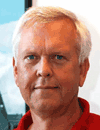Co-Located Conference AgendasAdvances in Biodetection and Biosensors | Advances in Microarray Technology | Lab-on-a-Chip European Congress | Single Cell Analysis Europe | 

Wednesday, 28 March 201208:00 | Registration | |
Session: Advances in Antibody and Antigen Microarrays |
| | 09:30 |  | Keynote Presentation Deciphering Complex Serum Portraits for Personalized Medicine in Oncology
Carl Borrebaeck, Professor and Deputy Vice Chancellor, Lund University, Sweden
One of the driving forces in personalized medicine is the search for protein patterns that can be utilized for improved diagnosis, assessing the risk for tumor relapse and disease progression. We have designed and developed antibody microarray, a high-throughput technology for protein expression profiling, to the point where it is now generating data for improved diagnosis, patient stratification etc. as well as insights into disease biology. Several clinical studies have been performed, including analysis of serum/plasma proteomes from patients suffering from e.g. glioblastoma multiforme, pancreatic carcinoma, gastric adenocarcinoma, CLL, breast cancer, and SLE. The presentation will be focusing on diagnosis, prediction of disease progression and differential diagnosis of different cancers, based on affinity proteomics. |
| 10:00 | Unlocking Biomarker Discovery in Human SLE Using Recombinant Antibody Micro- and Nano-Arrays
Christer Wingren, Associate Professor And Lecturer, Lund University, Sweden
We have developed recombinant antibody micro- and nano-arrays for unlocking biomarker discovery. Here, we have applied this technology to resolve unmet clinical needs in Systemic Lupus Erythematosus (SLE), and have discovered novel serum biomarker signatures for diagnosis, classification, and prognosis. | 10:30 | Coffee Break and Networking in Exhibition Hall | 11:15 | Antibody Arrays of the Human Protein Atlas
Jochen Schwenk, Director- Plasma Profiling Facility, KTH Royal Institute of Technology, Sweden
This talk will be about multiplexed profiling of body fluids using the vast collection antibodies generated and hosted by the Human Protein Atlas. | 11:45 | Fast-Tracking Molecular Diagnostics in Oncology via Antibody-Based Proteomics and Digital Pathology
William Gallaghr, Chief Scientific Officer/Professor, OncoMark Limited/University College Dublin, Ireland
This presentation will cover the utility of antibody-based profiling using tissue microarrays and associated digital pathology approaches to expedite the transition from biomarker discovery to validation in oncology. Case studies covering a range of cancer and biomarker types will be outlined. | 12:15 | Lunch Break and Networking in Exhibition Hall | 13:30 | Poster Viewing Session | 14:45 | Discovering Biomarkers for Early Disease Detection and Companion Diagnostics by Protein Antigen Array-Based Screening of Serum
John Anson, Vice President, Biomarker Discovery, Oxford Gene Technology, United Kingdom
This presentation will highlight the potential importance of autoantibodies as biomarkers for early disease detection, companion diagnostics and monitoring of immunotherapy. A novel array based screening platform for discovering panels of disease-specific antigens to detect this response will also be discussed. | 15:15 | Coffee Break and Networking in Exhibition Hall | |
Session: Advances in Protein Microarrays |
| | 16:00 |  | Keynote Presentation Protein Microarray Technologies - Analysis of Signaling Networks in Tumours
Michael Pawlak, Head, University of Tuebingen, Germany
Complex data sets generated from limiting sample material allow the identification of differences in activation of signaling networks directly on the protein level. Protein microarray analysis of tumor biopsies and data generated during anti-cancer drug development demonstrate the power of available technologies. |
| 17:00 | Innovative Materials and Protocols to get Sub-Femtomolar Detection Limits in Protein Microarrays
Marina Cretich, Researcher, National Research Council, Italy
High sensitivity and specificity are the ultimate goals for protein microarray developers. Innovative materials to enhance fluorescence detection, specificity of capture and detection antibodies as well as new protocols to overcome mass transport limitations of the protein targets will be shown. | 17:30 | Drinks Reception |
Thursday, 29 March 2012 |
Session: Using Microarrays to Study Pathogens and Antibiotic Resistance |
| | 09:00 | New Molecular Tests Unveil Antibiotic Resistance
Till Bachmann, Reader, University of Edinburgh, United Kingdom
Today, antibiotic resistance is a worldwide threat with extra costs of 1.5 billion € per year in the EU alone. We developed DNA microarrays and ThermaLight, a novel molecular assay for Extended Spectrum Beta-Lactamases for rapid multiplexed diagnostics and therapy guidance. | 09:30 | Exploring the Global Genomic Landscape of Enteric Pathogens: Genes, INDELs, SNPs-n-Chips
Scott Jackson, Principal Investigator/Molecular Epidemiologist, United States Food and Drug Administration, United States of America
Custom high density microarrays represting ~100 genomes and multiple species of enteric pathogens are utilized in real-time foodborne outbreak investigations as well as microbial bioforensic investigations. | 10:00 | Systematic Analysis of Immune Response Against Varicella Zoster Virus (VZV) using a Self-Assembled Protein Microarray
Colin Campbell, Senior Lecturer, University of Edinburgh, United Kingdom
We have assembled a protein microarray which includes the entire proteome of Varicella Zoster Virus. By screening clinical samples using the VZV array we have identified biomarkers with potential diagnostic of therapeutic value. | 10:30 | Coffee Break and Networking in Exhibition Hall | |
Session: Novel Microarray Technologies |
| | 11:15 | Polymer Microarrays - Fabrication and Biological Application for Stem Cell Control and Manipulation
Mark Bradley, Professor of Therapeutic Innovation, Precision Healthcare University Research Institute, Queen Mary University of London, United Kingdom
I will demonstrate a variety of approaches for at the preparation and high-content screening of polymer microarray platform and their application in a number of cell based screens. Fabrication methods, including direct inkjet based polymer synthesis and analysis with fixed and live cells on over 10,000 features will be described. A focus on human stem cell control will also be discussed. | 11:45 | Self-Reporting Microarray Platforms that use Molecular Beacon Probes
Salvatore Marras, Assistant Professor, University of Medicine and Dentistry of New Jersey, United States of America
Molecular beacon probes, which generate a fluorescence signal only when they bind to their target, enable the development of self-reporting DNA microarrays. This presentation will show how unlabelled nucleic acids can be detected using arrayed molecular beacons. | 12:15 | Lunch Break and Networking in Exhibition Hall | 13:15 | Poster Viewing Session | 14:00 | Scaling Up the Multiplexed Transcriptional Library for Monitoring Cell Signalling using a Microarray Sensor Platform
Abdullah Gibriel, Assistant Professor in Biochemistry and Molecular Biology, Faculty of Pharmacy, Ahram Canadian University, Egypt
A unique reporter based microarray platform has been designed to monitor changes in transcription factor activity within cells. The sensitivity, robustness and reproducibility of this platform could be used to deconvolute complexity of cell signaling networks and in drug discovery. | 14:30 | Multi Parametric Protein Analysis using Novel Hydrogel Based Microarrays
Thomas Brandstetter, Group Leader, University of Freiburg, Germany
A novel 3D-hydrogel technology consisting of a simple manufacturing and one-step immobilization process for multi parametric, microarray based protein analysis in small sample volumes was developed. Multiplex cytokine assays will illustrate the strength of this approach compared to ELISA tests. | 15:00 | Coffee Break and Networking in Exhibition Hall | 15:30 | Adhesive Microarrays: A New Integrative Solution
Benjamin Corgier, Senior Researcher, Universite Lyon 1, France
The presentation illustrates the "adhesive microarray" approach for biomolecule immobilisation through significant analytical bio assays. The process is highly flexible, provides ease of implementation and produces reliable microarrays of active biomolecules for device assembling and subsequent automated processing. | 16:00 | Surface Tension Confinement Chip for Small Volume Micro- and Nano-Array Applications
Ekaterina Mckenna, Enterprise Fellow, University of Glasgow, United Kingdom
Small sample volume application to bio-arrays is facilitated by surface tension confinement on hydrophilic silicon dioxide chips patterned with a hydrophobic polymer. A concept modular bio-array slide probing kit based on such chips has a wide range of potential applications. | 16:30 | Close of Conference |
|


 Add to Calendar ▼2012-03-28 00:00:002012-03-29 00:00:00Europe/LondonAdvances in Microarray TechnologyAdvances in Microarray Technology in Edinburgh, ScotlandEdinburgh, ScotlandSELECTBIOenquiries@selectbiosciences.com
Add to Calendar ▼2012-03-28 00:00:002012-03-29 00:00:00Europe/LondonAdvances in Microarray TechnologyAdvances in Microarray Technology in Edinburgh, ScotlandEdinburgh, ScotlandSELECTBIOenquiries@selectbiosciences.com